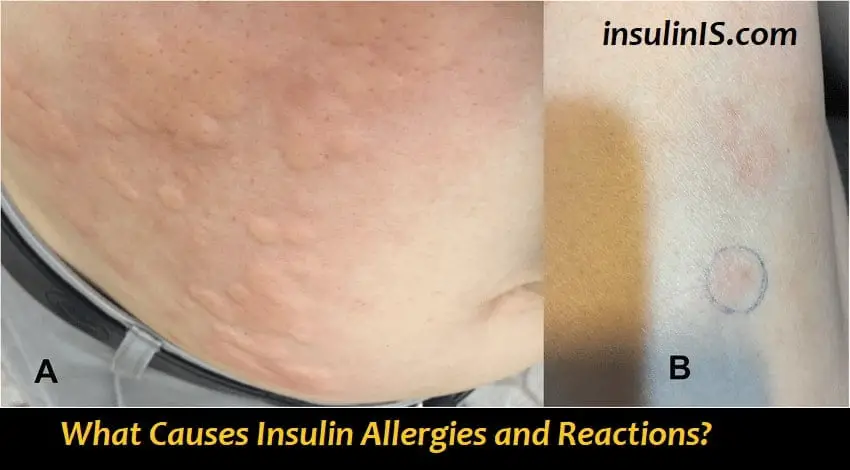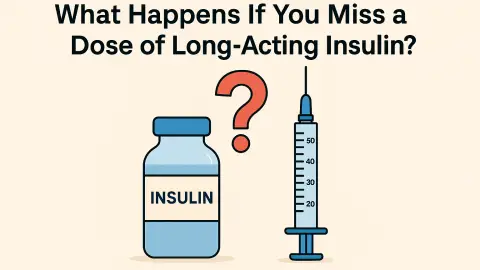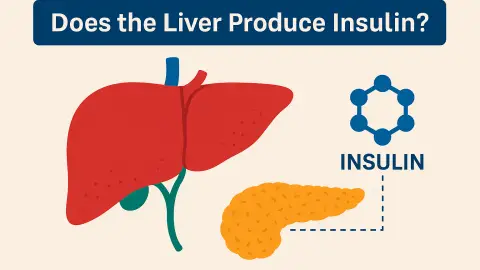For individuals with diabetes, insulin is a lifesaving medication that regulates blood sugar levels and promotes overall health. However, some individuals may experience insulin allergies or reactions, which can be potentially dangerous and lead to severe health complications. In this article, we will provide you with a comprehensive guide to preventing insulin allergies and reactions, including common causes, symptoms, treatment options, and preventive measures (Trusted Source: 01).

Causes of Insulin Allergies and Reactions
Insulin allergies and reactions are uncommon but can occur in some individuals. These responses are caused by the immune system misidentifying insulin or its components as harmful, leading to allergic symptoms. Here’s an overview of the primary causes behind insulin allergies and reactions:
1. Immune Response to Insulin Proteins
Some individuals may develop an allergic reaction to the insulin molecule itself. This is more common with non-human insulin (e.g., animal-derived insulin), but even modern human insulin or insulin analogs can sometimes trigger this response.
Why it happens:
- The immune system sees insulin as a foreign protein and produces antibodies.
- This immune reaction can result in local or systemic allergic symptoms.
2. Additives and Preservatives in Insulin Formulations
Insulin products often contain additional ingredients to stabilize the medication or prevent bacterial growth. Common additives include:
- Protamine: Found in intermediate-acting insulin (e.g., NPH insulin).
- Zinc: Used in some insulin types to prolong their action.
- Phenol or Metacresol: Preservatives in many insulin formulations.
Reactions:
- Localized irritation or swelling at the injection site.
- Systemic allergic responses in rare cases.
3. Latex Allergy
Some individuals are allergic to latex, which can be found in the rubber stoppers of insulin vials or in certain pen devices.
Symptoms:
- Rash or itching after handling insulin containers or pens.
Prevention:
- Use latex-free syringes or pens.
4. Impurities in Insulin
Although rare with modern insulin production, impurities or contaminants in the formulation can trigger allergic reactions.
Context:
- Older animal-derived insulins were more likely to cause allergies due to the presence of impurities.
- Human insulin and insulin analogs have significantly reduced this risk.
5. Injection Technique and Site Issues
Improper injection techniques or repeated use of the same site can cause localized irritation or allergic-like symptoms.
Examples:
- Not rotating injection sites, leading to skin inflammation or lipodystrophy.
- Using alcohol or other antiseptics that irritate the skin before injecting.
6. Insulin Resistance Linked to Allergies
In rare instances, the body produces antibodies against insulin, neutralizing its effects and causing insulin resistance. This can be accompanied by allergic symptoms.
7. Cross-Reactivity with Other Allergens
Sometimes, individuals with existing allergies (e.g., food or environmental allergens) may be more prone to reacting to certain components in insulin formulations.
Managing and Preventing Insulin Allergies
Allergy Testing: Identifying specific allergens with skin or blood tests.
Switching Insulin Types: Trying a different formulation or brand may help.
Desensitization Therapy: Gradual introduction of small insulin doses under medical supervision.
Using Purified Insulin: Opting for preservative-free or additive-free options.
Proper Injection Techniques: Ensuring clean, rotated injection sites.
Preventing Insulin Allergies and Reactions
Preventing insulin allergies and reactions is essential for individuals who rely on insulin for diabetes management. While allergic responses to insulin are rare, following certain practices can minimize the risk of developing them. Here are key strategies for prevention:
1. Use High-Purity Insulin
Modern insulin formulations, such as human insulin and insulin analogs, are highly purified and less likely to cause allergic reactions compared to older animal-derived insulin.
- Choose preservative-free insulin if you are sensitive to additives.
- Opt for recombinant insulin products to avoid potential immune reactions.
2. Gradual Introduction of Insulin (Desensitization)
For individuals with known insulin allergies, desensitization therapy can help reduce allergic responses.
- Small doses of insulin are administered under medical supervision.
- The dose is gradually increased until the full therapeutic amount is reached.
3. Rotate Injection Sites
Repeated injections in the same site can lead to skin irritation and localized allergic reactions. To prevent this:
- Use a systematic rotation schedule for injection sites.
- Avoid injecting into inflamed or scarred areas.
4. Avoid Latex-Containing Devices
Some insulin syringes, pen devices, or vial stoppers contain latex, which can trigger allergic reactions in sensitive individuals.
- Choose latex-free insulin delivery systems.
- Verify packaging or consult your healthcare provider for latex-free options.
5. Test for Allergies
If you suspect an allergy, allergy testing can help identify the specific cause.
- Skin Prick Testing: A small amount of insulin is introduced to the skin to observe for a reaction.
- Blood Tests: Measures specific antibodies that indicate an allergic response.
6. Switch to a Different Insulin Formulation
If an allergy is linked to a specific insulin product, switching to another type may resolve the issue.
- Try different formulations: Rapid-acting, long-acting, or intermediate-acting insulin options.
- Eliminate offending additives: Consult your doctor to find a product without preservatives or protamine.
7. Use Pre-Mixed or Custom Insulin
If sensitivity to specific insulin components is detected, pre-mixed or custom formulations can be tailored to avoid allergens.
8. Proper Injection Techniques
Ensuring proper injection practices can prevent reactions that mimic allergies.
- Always clean the injection site with warm water or a gentle antiseptic.
- Avoid using alcohol if it irritates your skin.
- Use a new needle for each injection to prevent contamination.
9. Antihistamine or Corticosteroid Pre-Treatment
If mild reactions occur, pre-treatment with antihistamines or corticosteroids may reduce allergic symptoms.
- Use these medications only under a doctor’s supervision.
10. Consult a Specialist
For persistent or severe reactions, consult an allergist or immunologist. They can provide targeted recommendations, including advanced diagnostic tests or alternative therapies.
When to Seek Immediate Help
If you experience severe reactions like difficulty breathing, swelling, or anaphylaxis, discontinue insulin use and seek emergency medical care immediately. Carrying an epinephrine injector may be advised for individuals at risk of severe reactions.
By adopting these strategies and working closely with healthcare professionals, individuals can effectively manage or avoid insulin allergies, ensuring optimal diabetes control.
Types of Insulin Allergies
Understanding the types of insulin allergies and their symptoms is essential for timely identification and treatment.
1. Localized Allergic Reactions
Localized insulin allergies occur at the injection site. These reactions are the most common and typically present with symptoms such as:
- Redness
- Swelling
- Itching
- Pain
Causes:
Localized reactions are often caused by preservatives or additives in insulin formulations. Sometimes, they are due to the immune system reacting to the insulin protein itself.
Management:
- Rotating injection sites to reduce irritation.
- Switching to a different insulin brand or formulation under a doctor’s supervision.
2. Systemic Allergic Reactions
Systemic reactions affect the entire body and are less common but more serious. Symptoms may include:
- Rash or hives (urticaria)
- Difficulty breathing
- Drop in blood pressure
- Nausea or vomiting
Causes:
Systemic allergies are often triggered by an immune response to animal-based insulin or additives. Human or analog insulin typically has a lower risk of causing systemic reactions.
Management:
- Immediate medical attention for severe symptoms.
- Use of antihistamines or corticosteroids as prescribed.
- Switching to a purer form of insulin.
3. Insulin Resistance Due to Allergic Reaction
In rare cases, the body produces antibodies that neutralize insulin’s effects, leading to insulin resistance.
Symptoms:
- Uncontrolled blood sugar levels despite proper dosage.
Causes:
- Immune reaction to insulin proteins.
- Prolonged exposure to certain insulin types.
Management:
- Monitoring blood sugar levels closely.
- Immunotherapy or alternative treatment plans.
4. Anaphylaxis (Severe Allergic Reaction)
Anaphylaxis is a life-threatening allergic reaction to insulin. Though exceedingly rare, it requires immediate attention.
Symptoms:
- Severe difficulty breathing
- Swelling of the throat and tongue
- Rapid heartbeat
- Loss of consciousness
Management:
- Administer epinephrine (if prescribed) immediately.
- Call emergency services for prompt treatment.
- Consultation with a specialist for alternative diabetes management strategies.
Preventing Insulin Allergies
- Skin Testing: Before starting a new insulin formulation, allergy testing can help identify potential risks.
- Preservative-Free Insulin: Some patients benefit from switching to formulations without preservatives.
- Desensitization Therapy: Under medical supervision, small doses of insulin are gradually introduced to reduce allergic responses.
Insulin allergies, while uncommon, can significantly impact diabetes management. Early identification and appropriate treatment strategies are key to addressing these reactions. If you suspect an allergy, consult a healthcare provider to determine the best course of action.
Common Symptoms of Insulin Allergies and Reactions
The symptoms of insulin allergies and reactions can vary in severity and can range from mild to severe. Common symptoms include:
- Swelling, redness, or itching at the injection site
- Hives or rash
- Shortness of breath or wheezing
- Dizziness or fainting
- Rapid heartbeat
- Nausea or vomiting
In severe cases, insulin allergies and reactions can cause anaphylaxis, a life-threatening allergic reaction that requires immediate medical attention.
Treatment Options for Insulin Allergies and Reactions
Insulin allergies and reactions, though rare, can interfere with effective diabetes management. Timely identification and treatment of these issues are critical for maintaining blood sugar control and ensuring safety. Below are the treatment options for managing insulin allergies and reactions:
1. Switching Insulin Formulations
Changing to a different type of insulin can often resolve allergic reactions.
- Human Insulin or Insulin Analogs: Modern, highly purified forms of insulin are less likely to cause allergies compared to animal-derived insulin.
- Preservative-Free Insulin: Reduces reactions triggered by preservatives like phenol or metacresol.
- Alternative Insulin Types: Long-acting, rapid-acting, or intermediate-acting formulations may be better tolerated.
2. Antihistamines for Mild Allergic Reactions
For localized reactions, antihistamines can help manage symptoms such as itching, redness, or swelling.
- Over-the-counter antihistamines like cetirizine or diphenhydramine may be effective.
- Use under the guidance of a healthcare provider to ensure safety.
3. Corticosteroid Therapy
Corticosteroids can reduce inflammation and allergic symptoms in more severe cases.
- Topical Corticosteroids: Applied to the injection site for localized reactions.
- Systemic Corticosteroids: Prescribed for systemic or generalized allergic responses.
4. Desensitization Therapy
This approach is used when no alternative insulin formulations are suitable.
- Small, gradually increasing doses of insulin are administered under strict medical supervision.
- Over time, this helps the immune system tolerate insulin without reacting adversely.
5. Immunotherapy
In cases where antibodies interfere with insulin’s effectiveness (insulin resistance due to allergy), immunotherapy may be recommended.
- Medications like immunosuppressants can suppress the immune response.
- This option is used sparingly and only in severe cases.
6. Epinephrine for Severe Reactions
For life-threatening reactions like anaphylaxis, epinephrine is the first-line treatment.
- Administer an epinephrine injection immediately if symptoms like difficulty breathing, throat swelling, or a rapid drop in blood pressure occur.
- Seek emergency medical attention without delay.
7. Adjusting Injection Techniques
Poor injection practices can mimic allergic reactions. Making adjustments may alleviate symptoms:
- Rotate injection sites to avoid localized irritation.
- Use shorter or thinner needles to minimize trauma.
- Avoid alcohol swabs or antiseptics that irritate the skin.
8. Skin Testing
Before initiating insulin therapy, especially for individuals with a history of allergies, skin testing can help identify potential allergens.
- A small amount of insulin is injected to observe for localized reactions.
- Based on the results, an appropriate insulin type can be selected.
9. Monitoring and Medical Follow-Up
Regular monitoring of symptoms and blood glucose levels is critical for individuals with insulin allergies.
- Keep a detailed record of reactions and their triggers.
- Schedule follow-ups with an endocrinologist or allergist for long-term management.
10. Alternative Diabetes Management Options
For individuals unable to tolerate any form of insulin, other diabetes treatments may be explored:
Insulin Pump Therapy: Delivers smaller, continuous doses of insulin, which may reduce the likelihood of reactions.
Oral Medications: For those with residual pancreatic function (e.g., in type 2 diabetes).
Non-Insulin Injectables: Such as GLP-1 receptor agonists.
Preventive Measures to Avoid Insulin Allergies and Reactions
Preventing insulin allergies and reactions requires a comprehensive approach that involves identifying and avoiding triggers, proper injection technique, and regular monitoring of blood sugar levels. Here are some preventive measures to avoid insulin allergies and reactions:
- Identify and Avoid Allergy Triggers
If you have experienced insulin allergy or reaction in the past, it is essential to identify the triggers that caused the reaction and avoid them. For instance, if you are allergic to insulin preservatives, you may need to switch to preservative-free insulin.
- Proper Injection Technique
Proper injection techniques can help reduce the risk of injection site reactions and minimize the risk of allergic reactions. Some tips for proper injection technique include:
- Clean the injection site with an alcohol swab before the injection
- Rotate injection sites to avoid repeated injections in the same area
- Use the correct needle length for your body type
- Use the correct injection angle
- Regular Blood Sugar Monitoring
Regular blood sugar monitoring can help identify insulin resistance or other issues that may increase the risk of insulin allergy or reaction. It is essential to monitor your blood sugar levels regularly and adjust your insulin dose as necessary.
FAQs About Insulin Allergies and Reactions
A: Yes, insulin allergies and reactions can be prevented by identifying and avoiding triggers, proper injection techniques, and regular blood sugar monitoring.
A: If you experience symptoms of insulin allergy or reaction, seek medical attention immediately. Do not wait for the symptoms to worsen or disappear on their own. Call your doctor or go to the emergency room as soon as possible.
A: Yes, insulin allergy or reaction can occur suddenly, even if you have been using insulin for a long time without any issues. This is why it is important to monitor your blood sugar levels regularly and be aware of the symptoms of insulin allergy or reaction.
A: Yes, there are new trends and advancements in insulin therapy that can help prevent insulin allergies and reactions. For instance, some new insulin formulations have been developed that are less likely to cause allergic reactions. Additionally, new delivery systems such as insulin pumps can help reduce the risk of injection site reactions.
New Trends and Advancements in Insulin Therapy
Recent advancements in insulin therapy have significantly enhanced diabetes management, offering patients more effective and convenient options. Key developments include:
1. Once-Weekly Insulin Injections
Traditional insulin regimens often require daily injections, which can be burdensome for patients. Innovations have led to the development of once-weekly insulin formulations:
- Insulin Icodec (Awiqli): Approved in Canada and the European Union in 2024, insulin icodec is an ultralong-acting basal insulin analogue designed for once-weekly administration. Clinical trials have demonstrated its non-inferiority to daily insulin glargine U100 in controlling blood glucose levels. Wikipedia
- Efsitora Alfa: Eli Lilly’s experimental once-weekly insulin, efsitora alfa, has shown comparable efficacy to daily injections in phase 3 clinical trials. This development aims to simplify diabetes management and improve patient adherence. Barron’s
2. Automated Insulin Delivery Systems
The integration of technology into insulin delivery has led to the creation of automated systems that closely mimic the pancreas’s function:
- Omnipod 5: Insulet’s Omnipod 5 is an automated insulin delivery (AID) system that integrates with continuous glucose monitors (CGMs) to adjust insulin delivery in real-time. It has been approved for use in both type 1 and type 2 diabetes, enhancing glucose control and reducing the burden of diabetes management. Drug Delivery Business
- MiniMed 780G: Medtronic’s MiniMed 780G system features advanced algorithms that automate insulin delivery, aiming to maintain glucose levels within the target range and reduce hypoglycemia risk. Studies have shown its effectiveness in improving glycemic control. Drug Delivery Business
3. Artificial Pancreas Systems
Artificial pancreas systems combine CGMs and insulin pumps with sophisticated algorithms to automate blood glucose management:
- Bionic Pancreas: This device automatically delivers insulin based on real-time glucose readings, reducing the need for manual insulin administration and improving glucose control in individuals with type 1 diabetes. National Institutes of Health
4. Stem Cell Therapies
Innovative treatments are exploring the regeneration of insulin-producing cells:
- Stem Cell Transplants: Recent breakthroughs have demonstrated the potential to reverse type 1 diabetes through stem cell transplants, enabling patients to produce insulin naturally and reducing or eliminating the need for external insulin administration. The Scottish Sun
5. Smart Insulin
Research is underway to develop insulin formulations that respond dynamically to blood glucose levels:
- Glucose-Responsive Insulin (GRI): Scientists are working on “smart” insulin that activates in response to high blood sugar levels, potentially reducing the frequency of injections and the risk of hypoglycemia. The Sun
These advancements represent significant strides in insulin therapy, aiming to improve patient outcomes and quality of life by simplifying diabetes management and enhancing glucose control.
Conclusion
Insulin allergies and reactions can be potentially dangerous and lead to severe health complications. However, with proper education, preventive measures, and advancements in insulin therapy, the risk of insulin allergies and reactions can be significantly reduced. By following the tips and guidelines provided in this article, you can effectively manage your insulin therapy and prevent allergic reactions. Remember, always seek medical attention immediately if you experience symptoms of insulin allergy or reaction.



